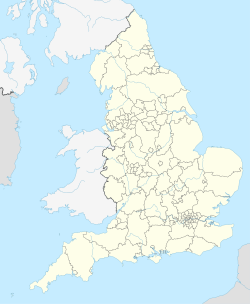Our website is made possible by displaying online advertisements to our visitors.
Please consider supporting us by disabling your ad blocker.
Reading, Berkshire
Reading (/ˈrɛdɪŋ/ ⓘ RED-ing)[2] is a town and borough in Berkshire, England, and the county town of Berkshire. Most of its built-up area lies within the Borough of Reading, although some outer suburbs are parts of neighbouring local authority areas. Located in the Thames Valley at the confluence of the rivers Thames and Kennet, Reading is 40 miles (64 km) east of Swindon, 28 miles (45 km) south of Oxford, 40 miles (64 km) west of London and 16 miles (26 km) north of Basingstoke.
Reading is a major commercial centre, especially for information technology and insurance.[3] It is also a regional retail centre, serving a large area of the Thames Valley with its shopping centres, including the Oracle, the Broad Street Mall, and the pedestrianised area around Broad Street. It is home to the University of Reading. Every year it hosts the Reading Festival, one of England's biggest music festivals. Reading has a professional association football team, Reading F.C., and participates in many other sports.
Reading dates from the 8th century. It was a trading and ecclesiastical centre in the Middle Ages, the site of Reading Abbey, one of the largest and richest monasteries of medieval England with royal connections, of which the 12th-century abbey gateway and significant ancient ruins remain. By 1525, Reading was the largest town in Berkshire, and tenth in England for taxable wealth. The town was seriously affected by the English Civil War, with a major siege and loss of trade, but played a pivotal role in the Glorious Revolution, whose only significant military action was fought on its streets. The 18th century saw the beginning of a major ironworks in the town and the growth of the brewing trade for which Reading was to become famous. The 19th century saw the coming of the Great Western Railway and the development of the town's brewing, baking and seed-growing businesses, and the town grew rapidly as a manufacturing centre.
- ^ a b UK Census (2021). "2021 Census Area Profile – Reading Local Authority (E06000038)". Nomis. Office for National Statistics. Retrieved 5 January 2024.
- ^ "Reading". Collins Dictionary. n.d. Archived from the original on 5 December 2014. Retrieved 23 September 2014.
- ^ "Government & public sector". PwC. Archived from the original on 24 April 2014. Retrieved 23 April 2014.
Previous Page Next Page












